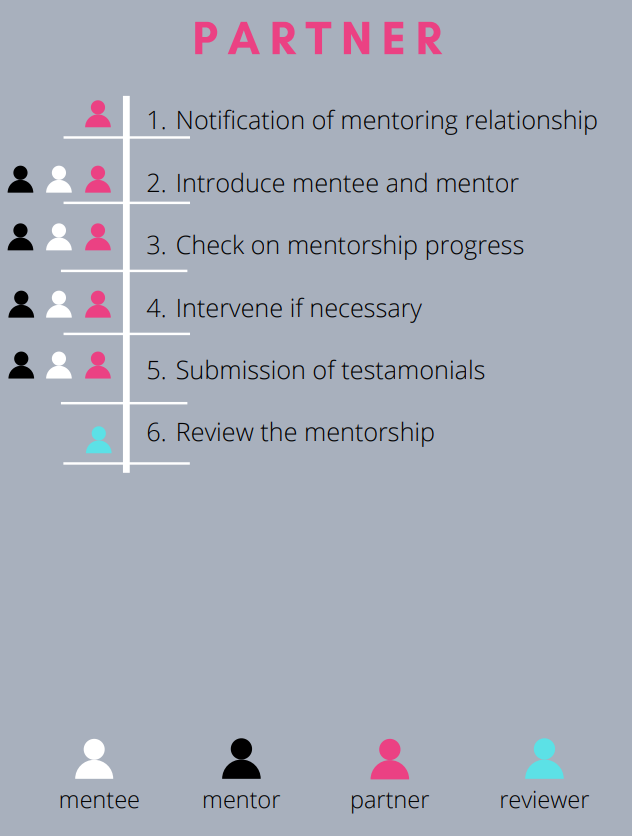Thank you for offering to support the ALDinHE Mentoring Scheme through your role of a Partner. We are delighted to welcome you to the programme. On this website, you will find all the essential information regarding your liaison role between Mentors, Mentees, and ALDinHE, both in the Mentoring Scheme and the Certified Mentor (CeM) recognition. The side menu also includes the information and materials given to Mentors and Mentees, for your reference.

The ALDinHE Mentoring Scheme aims to provide learning developers with an opportunity to draw on the knowledge and experience of other colleagues to find their voice within learning development through being mentored. Our ambition is to support mutually beneficial professional relationships and bring compassion and generosity into our working environments. Your role as a Partner is essential when it comes to providing this support and we are grateful for your time and expertise.
Mentors participating in the Scheme may choose to apply for recognition as ALDinHE Certified Mentors (CeM) or continue to use the ALDinHE Mentoring Scheme to support colleagues without certification. If they apply for certification, your ‘final report’ will provide the evidence for their mentoring work.
Six tasks carried out by the Partner

This diagram and the details below explain the steps undertaken by the ALDinHE Partner, in order to support the mentoring process.
The six stages carried out by the mentor and mentee are shown in stage 1 of the mentee journey.
Please note: Step 6 of the Partner tasks is only relevant for mentors that apply for accreditation.
Instructions for the six Partner tasks
STEP 1: Notification of mentoring relationship
The mentoring relationship will be initiated by the Mentee who will contact ALDinHE with a request for a Mentor. At this point an ALDinHE Partner will be assigned. As a Partner, you will be provided with the name of the Mentee as well as the suggested Mentor. You may also be asked for suggestions regarding the best pairing.
STEP 2: Introduce Mentee and Mentor
As the Partner, you will make the necessary introductions between the Mentor and Mentee (via email), as well as present yourself as someone both parties may turn to for support and confidential advice.
STEP 3: Check on the mentorship progress
The Mentor and Mentee will share with you their logbook via the document library (accessed via the right hand menu) which records the meetings and reflections of both. The aim of the logbook is to plan and to reflect, to structure meetings and to record their frequency, to monitor progress and to exchange ideas. There is an expectation that brief updates would be logged at least on a monthly basis.
STEP 4: Intervene if necessary
Your role is to ensure that the records are kept in the logbook and to gently intervene if necessary. In the first place, contact the Mentee, who is expected to be the driving force behind the mentoring relationship and who might need more support than the Mentor. If the initial ‘Compatibility meeting’ was not fruitful, your help to find a new mentor may be required.
STEP 5: Submission of testimonials
The Mentor and Mentee will inform you when they are ready to draw the relationship to a close. While it is solely their decision, you might want to advise Mentors that for the CeM recognition, they need to evidence around 6 months’ or 10 hours’ worth of contact.
Testimonial
At the end of the mentoring relationship, the Mentor and Mentee are required to submit their individual reflections on the mentoring process. They will be sent to you and based on these reflections you will write a brief testimonial from the mentoring and send it to admin@aldinhe.ac.uk.
Your testimonial will serve as a closing note for the mentoring relationship. It will be a brief and objective summary and assessment of the mentoring relationship as witnessed and observed by you. It will be based on the interactions you have had with both parties, as well as their logbooks and final reflections. For Mentors and Mentees, it is also an important symbolic closure.
For the CeM Scheme, the goal of this testimonial is to verify and confirm the claims made by Mentors and Mentees to help with an objective documentation of the mentoring relationship and its eligibility for recognition. These are some questions you might want to address, which refer back to the guiding principles of the Mentorship Scheme:
- Does the documentation demonstrate the mentor’s commitment to ALDinHE values?
- Has the mentor demonstrated the ability to reflect and use the insights gained to develop mentoring practice?
- Has the mentor fostered a partnership approach and valued the mentee’s perspective?
- Has the mentor shown generosity?
- Has the mentor been trustworthy and maintained confidentiality?
- What evidence of learning and development has the mentor demonstrated?
The testimonial should be up to 250 words in length and should comment on any of the above criteria if they had not been met and elaborate on areas of exceptional strength. Please submit it to admin@aldinhe.ac.uk within 3 weeks after mentoring ends.
Please send your testimonial to admin@aldinhe.ac.uk.
STEP 6: Review the mentorship
Mentors who have been involved in a minimum of 2 substantial mentoring experiences, at least one of them through the ALDinHE Mentoring Scheme, can apply for recognition as Certified Mentor (CeM). Since the ongoing logbook, the final reflections and your testimonial already provide evidence of the Mentor’s work, these can be cross-referenced in the application process. Occasionally the reviewer might approach you with a question in this context.
